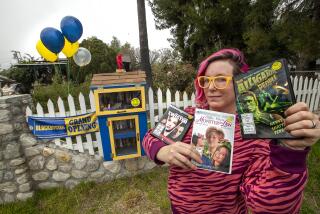Bundle of Fun! Aims to Hone Children’s Playtime Initiative : Recreation: A former day-care teacher says youngsters tend to discard high-tech toys in favor of simple ones that she puts in her tote bag.
- Share via
If you have children, wander into their rooms and take note.
How many of their toys can pass the rain test?
In other words, how many toys would be destroyed by something as simple as water? And how many batteries in those toys would rust, or the electronics irrevocably flooded?
That should give you an idea of how far afield from a child’s imagination the toy world can get.
Michele Lissie of New Britain, Conn., recently started a mail-order business, Bundle of Fun! based on the notion that children are given too many toys that don’t require imagination. Her toys--prepackaged in age-appropriate canvas totes--include blocks, books and puppets that fit a toddler’s hand. There are no battery-operated or electronic toys.
Lissie, who before she started her business was head teacher at a day-care center, said she got the idea soon after the birth of her daughter, Amanda, now 3.
“I was dealing with kids at the day care where their imaginations were gone,” she said. “Toys do everything for them. They don’t have to be creative to know how to operate them.”
Bundle of Fun! was born.
“The market is so inundated with high-tech toys,” Lissie said. “I find people are more interested in something that’s going to be a keepsake.”
Nancy Romano, director of the preschool at Apple Tree Day Care Center in Middletown, Conn., said that the children there are much more interested in dressing up or playing in the center’s pretend kitchen than operating a joystick.
They do not ask for Nintendo.
“Creative toys, toys that don’t have a function, are the best,” Romano said. A large cardboard box is probably a favorite among kids, she said. “They can paint it, cut it, live in it. They love that.
“They play with them longer, too.”
It’s hard to say what the kids at Hartford’s Oak Tree Day Care Center like to play with most.
It might be the blocks.
It might be trucks or books.
“They form their own little groups and do different things,” director Jane Thompson said. “Everything is their favorite toy.”
They do not play with high-tech toys because Thompson does not have any. And they don’t ask for them when they arrive at the day-care center.
That should come as no surprise to any parent who has purchased an involved electronic toy and assembled it, only to watch it get shoved into a corner once the child has figured out its purpose. A wander down the aisles of most of the larger toy stores reveal toys that light up, move in circles, talk or shoot imaginary spaceships from the sky--kids not included.
However, in the last few years, some toy stores have catered to a clientele more interested in creative toys.
So Lissie may be on to something.
Despite the Nintendo craze (market analysts say the sales of just one Nintendo product could reach $1 billion this year), the big sellers still are the simpler toys, according to a spokeswoman at Toy Manufacturers of America, the industry trade association. The more popular toys are play kitchens, Hot Wheels cars, the classic Barbie doll and Teenage Mutant Ninja Turtles action figures.
Whether parents agree or disagree with the politics of a toy such as Barbie, at least the doll is non-electronic and requires some imagination.
“I remember my favorite toys: hobbyhorses on a stick, a rag doll you could carry around,” Lissie said. “I remember creating my own little play world.”
But children are as much victims of a media blitz as are their parents, and children who watch a lot of television see commercials that make electronic and battery-operated toys seem like a must. Romano said parents can handle their children’s requests for non-imaginative toys by limiting them to one special toy.
“Say, ‘I am not going to give you 10 of these,’ ” she said. “You don’t want all their toys to be that way. If they have too many choices, they can’t pick. Limit their choices. Get them one or two electronic toys.
Electronic toys “are the way a lot of children are going. You can always lead them out of that.”
Lissie said that she has limited her tote bags to preschoolers, mainly because “once they get to be 5 or so, they get so trendy.” Perhaps in the future, she said, she will make a play tote or basket for the older children. Her products sell for about $27. She offers four totes--for the newborn baby and its mother; 1- to 2-year-olds; ages 2 to 3, and children 4 and older.
More to Read
The biggest entertainment stories
Get our big stories about Hollywood, film, television, music, arts, culture and more right in your inbox as soon as they publish.
You may occasionally receive promotional content from the Los Angeles Times.










